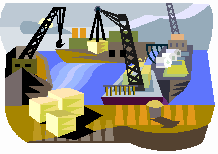DMC/S&T/22/01
Navios Handybulk Inc. v. International Materials Inc., the ‘Bei Ji Xing’
Award of Society of Maritime Arbitrators, New
York
September, 2001
GYPSUM CARGOES CARRIED IN SELF-DISCHARGING SHIP: CARGO FOUND SOLIDIFIED ON ARRIVAL AT DISCHARGE PORT: NO EVIDENCE OF FAULT WITH SHIP’S EQUIPMENT: CHARTERERS RESPONSIBLE FOR DELAY IN DISCHARGING AND EXTRA COSTS INCURRED
Summary
A self-discharging bulk carrier was fixed to carry two grades of gypsum. One
parcel was found on arrival at the discharge port to be solidified. It could not
be discharged with the ship’s equipment and owners had to engage alternative
means of discharge. Charterers held responsible for the delay and costs
incurred.
DMC Category Rating: Confirmed
Facts
In January 1996, Navios, as owners, entered into a charterparty on the Genvoy
form with International Materials, as charterers, for shipment of gypsum from
Mexico to Maracaibo in Venezuela on board the Bei Ji Xing, a specialised
self-discharging bulkcarrier. Later that month, the ship loaded two grades of
gypsum at San Marcos Island in Mexico, a consignment of Grade A stowed in holds
2 and 4 and a consignment of Grade B stowed in holds 1, 3 and 5.
The ship arriv ed at Maracaibo on 31 January 1996 and the following day
commenced discharging the Grade B cargo, using her self-discharging equipment.
On completion of discharge of the Grade B parcel on February 3, the ship began
the discharge of the Grade A cargo. This operation had to be halted almost
immediately, because the Grade A gypsum had compacted solidly and would not flow
through the discharging gates at the bottom of the holds and on to the conveyor.
After the crew had tried unsuccessfully to free up the gates, the owners engaged
a floating crane to effect discharge. After more than half the Grade A gypsum
had been discharged, the size of its grab meant that operations with the
floating crane had to be stopped. Thereafter, the owners engaged specialist
contractors to break up the cargo by means of compressed gas.
ed at Maracaibo on 31 January 1996 and the following day
commenced discharging the Grade B cargo, using her self-discharging equipment.
On completion of discharge of the Grade B parcel on February 3, the ship began
the discharge of the Grade A cargo. This operation had to be halted almost
immediately, because the Grade A gypsum had compacted solidly and would not flow
through the discharging gates at the bottom of the holds and on to the conveyor.
After the crew had tried unsuccessfully to free up the gates, the owners engaged
a floating crane to effect discharge. After more than half the Grade A gypsum
had been discharged, the size of its grab meant that operations with the
floating crane had to be stopped. Thereafter, the owners engaged specialist
contractors to break up the cargo by means of compressed gas.

Whilst awaiting the arrival of these contractors, the owners moved the ship off the berth, in order to load its three empty holds with its next cargo of coal. The specialist equipment required by the contractors arrived in Maracaibo on February 13 and the discharge was completed two days later.
Owners, having previously put the charterers on notice, claimed demurrage for the delay in discharging, amounting to US$85,281, the additional discharging expenses they incurred in the amount of US$80,731, together with interest, attorneys’ fees and costs.
The charterparty provided for arbitration in New York
The Award
In an agreed award, the three arbitrators found that the primary cause of the
inability to discharge the gypsum was the condition of the cargo, which most
probably had a higher moisture content than reported, which had allowed it to
‘set’. There was no evidence of water ingress into the ship or of any defect
in the ship’s discharging equipment. The panel continued: ‘The burden of
proof, which requires a preponderance of credible evidence that the charterers
should not be liable for the demurrage and damages claimed, rests with the
charterers. In our opinion, the charterers failed to satisfy this burden. With
respect to the time lost at Maracaibo, the panel finds that the owners acted
prudently when they suspended the waiting time and loaded part of their next
cargo, thus mitigating those damages.’
The panel accordingly awarded owners the demurrage and damages claimed. Interest was awarded at the weighted averaged Prime Rate as published by Chase Manhattan Bank for the period. No allowance was made for attorneys’ fees and costs, but the panel rejected an argument advanced by the charterers to the effect that the provision for US law in the arbitration clause of the charterparty ‘mandated the American Rule, pursuant to which each side bears its own expenses.’ The fees and expenses of the arbitrators were assessed as to 25% against the owners and as to 75% against the charterers.